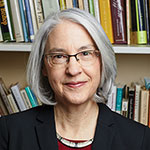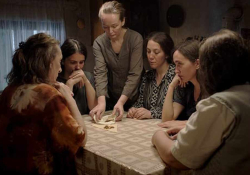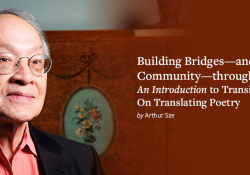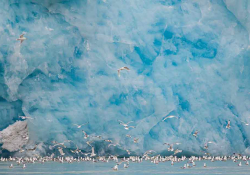Our Guide in Warsaw
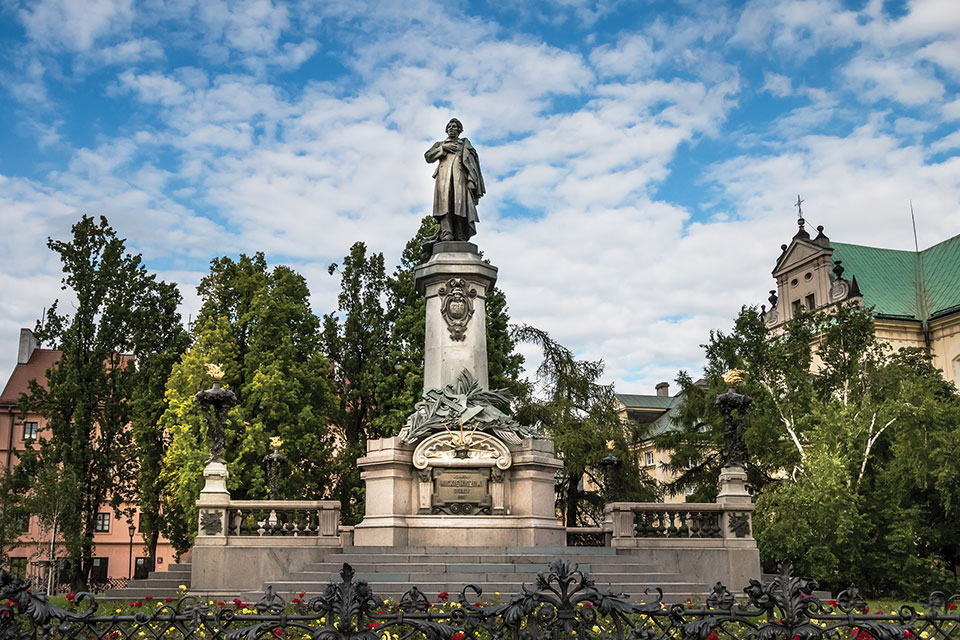
A couple finds their hired tour guide more sage for hire—like Socrates, an ambulatory pedagogue.
I saw him first from the back. He was standing alone by the big lobby window, looking out at the rain and mist enveloping Krakowskie Przedmiéscie, the Royal Route. A tall figure with black frock coat and cane, black dress shoes, tousled hair, white collar. I knew him. The Wanderer above the Sea of Fog.
My husband’s business client had booked us a private tour over the long weekend, and Leon was to be our guide. As we addressed him, he swiveled around and made a different impression—not the young Werther or even the ravaged Chopin. Older, in his fifties perhaps, though still somehow a youth in the sense that he was slightly gawky, untidy, despite his formal attire. Too tall for his clothes, I thought. Not a blond; raven hair, blue eyes, high cheekbones. Yet the resemblance to Friedrich’s wanderer would grow over the three days we spent with him, listening to his views on nature, art, god, and the heart of man. We covered many highlights of Warsaw during our tour, but it was Leon, not the monuments, that held the story, that will always hold the story.
The resemblance to Friedrich’s wanderer would grow over the three days we spent with him, listening to his views on nature, art, god, and the heart of man.
We were annoyed at first to learn that our guide was not a Warsavian. We had paid for local expertise. He was from Minsk, in Belarus, though he had resided here a few years now. And as I learned more about Polish history, its twists and tragedies, its occupations and its accordion borders, I saw just how Polish Leon really was, despite his foreign passport, how much its history had made him. The country had been repeatedly chopped up and devoured by neighbors; colonized, muzzled, enslaved, purged, liberated, obliterated, and reborn over the centuries since its origins around 900 ce. No wonder I mistook its ubiquitous white eagle for a phoenix. Poland, I began to see, was an idea, or maybe an idea of an idea, strengthened in adversity.
To complicate matters further, Leon was, he let us know, a secular Jew; a Wandering Jew it seemed, and an uncomfortable reminder in twenty-first-century Poland of the dark calculations and betrayals in the twentieth. But Leon did not live in the twenty-first century, or in much of the twentieth. He showed little interest in discussing the news items that had reached us over the past decade—the terrible crash in Smolensk that had killed the president and more than half of Parliament, the unholy alliance between the Catholic Church and the current Law and Justice government, the party’s threat to the judiciary, Putin’s threat to the eastern border and the influx of Ukrainians, the recent revelations about violent Polish anti-Semitism. These were simply more prompts for Leon to hold forth on Poland’s tragic destiny and the universal story of man’s inhumanity to man.
No, Leon identified not with any contemporary social or political group—urban liberals, rural nationalists, or oppressed minorities; he kept company in his imagination with the great artists, intellectuals and heroes of Poland’s Romantic period and the great aristocrats of its more distant golden age. As Leon walked us down the central boulevard of Stare Miasto (Old Town), he did not see the government-sponsored demonstrations in front of the Presidential Palace or the big Apple icon on the nylon shroud covering a restoration across the street. He saw the great statue of Christ bearing the cross, the emblem of Poland itself as the “Christ of Nations,” toppled in the war but quickly righted. He led us inside the Holy Cross Church, rebuilt from the ground after the Nazi bombing. With him we admired the beautiful baroque altar, but Leon’s worship was at the urn containing Chopin’s remains, brought home from Paris. Leon skipped the popular Rising Museum with its interactive story of 1945 (mobbed with school groups when I visited a few days later); skipped the exhibit on the Katyn massacre at the old Barbican. But he made sure we toured the Royal Castle to see the Marble Room with its trompe l’oeil ceiling, the portraits of Polish kings, the innumerable Canalettos. He walked us through the great halls of Warsaw University and paused before wigged luminaries of the Polish Enlightenment, sainted scientists from Copernicus to Curie. As for Stalin’s “gift to Warsaw,” the four-block phallic Palace of Science and Culture, it was clear to us that as far as Leon was concerned, the less said about that the better.
Leon kept company in his imagination with the great artists, intellectuals and heroes of Poland’s Romantic period and the great aristocrats of its more distant golden age
Leon had been especially pleased to meet us at the Hotel Bristol, erected by the great pianist Ignacy Paderewski in 1899. One would have thought it was Leon’s hotel, so complete was his identification with the great artist-statesman. Paderewski, an international star, had built this art nouveau palace believing that Poland deserved a world-class accommodation such as he had known in his tours of the great cities abroad. As we traveled to other Polish cities we would find Paderewski everywhere, a bronze prominence in central squares, though he had served as prime minister for less than a year, after which he left Poland for good. Artists, wherever they might live, had kept the idea of Poland alive through its geopolitical ordeals, and they were national heroes.
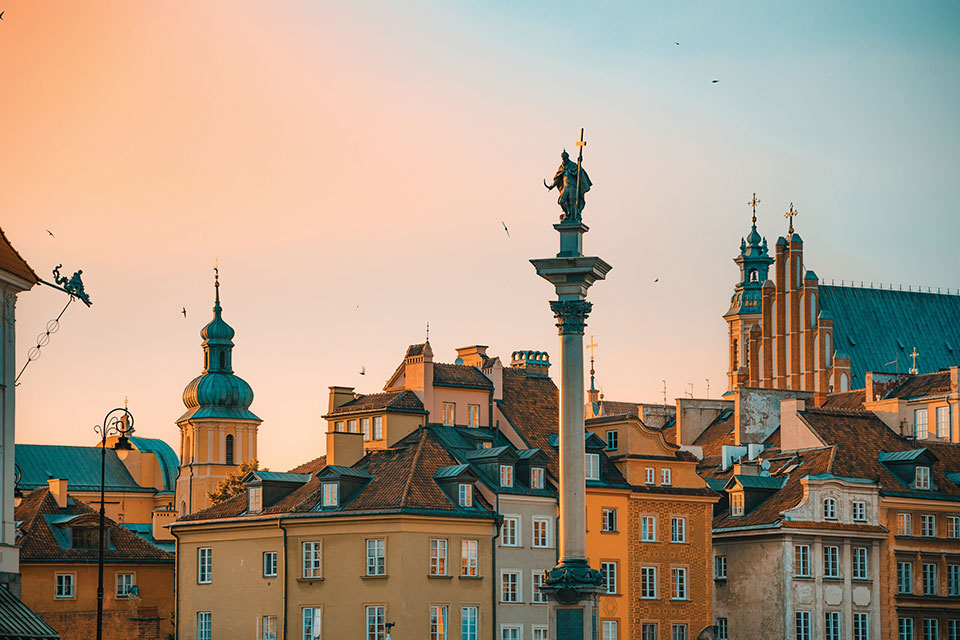
We wondered, with some embarrassment, where Leon went at night. What corner of Warsaw did he call home? He gestured vaguely toward the east and changed the subject. Warsaw, we knew, had become an expensive city relative to Polish wages, since it had joined the EU. We noticed that Leon wore the same clothes all three days and that they were a bit rumpled and dingy, the coat missing a button. He had a daughter in Minsk, he told us, and a granddaughter. He made no mention of a wife or a son-in-law. And he had spent very little of his adult life in Belarus, it turned out. With perestroika (and probably in flight from anti-Semitism) Leon had traveled to Grenoble for his belated education. He had studied theater, singing, literature, and languages. He had read all the great writers of the Western canon—Shakespeare to Shaw; Racine to Flaubert; Goethe to Rilke. He dreamed of the stage but was hindered by prejudice, he said. Still, he had found a place for his thwarted ambitions in this occasional work as a tourist guide, and he brought all his intellectual and creative powers to the task.
He was good at helping us picture the past—with wide-armed gestures he would conjure Kościuszko’s uprising against Prussia and Russia in the 1790s, Piłsudski’s march against Russian forces in the Battle of Warsaw in 1920. Looking out over the Vistula from the Citadel, he sang to us—he utilized all his talents—the hymn narodowy, “Poland Is Not Yet Lost.” He didn’t seem to see the seventy-thousand-capacity National Stadium for soccer (thanks to EU funding) obstructing the view.
Leon was less a tour guide than a sage for hire, like Socrates, an ambulatory pedagogue. The travel company had doubtless found his polylingualism useful—he claimed French, Italian, German, Russian, Polish, and English—and had deemed him fit to escort foreign visitors, despite his eccentricities and his eastern origins. We wondered how much of this company’s first-class fee was going to him.
Absurdly, our tour included a car and driver as well as Leon, even though, as we discovered, most of the sites were in pedestrian areas, blocked off to traffic. So we had interminable waits in cafés between sites—breaks in which we were implicitly expected to treat Leon to a cappuccino, a glass of wine, a Viennese pastry, or lavish lunch—while the car drove halfway around the city to the other side of a plaza, which we might easily have reached with a ten-minute walk. During those long intervals, Leon’s speeches were especially voluble. At first we found them tedious and would glance at each other as he pontificated, trying to avoid his blue eyes, deep as the Baltic, which wanted to lure us in. “Most people seek the yoke of tyranny . . . you must be vigilant to be free.” What could we do but nod, pick up our coffees, and sip? He had sensed our openness to thought and had pounced. We are bookish, and sometimes the aphorisms sounded vaguely familiar. “It is by suffering that human beings become angels.” Wasn’t that Victor Hugo? We would extricate ourselves from his hypnotic gaze with random questions out of the solid world. When was this street built? (Not that we cared.) What is the current population of Warsaw? (We already knew better than he did.) Which is the best store for buying amber? (He pointed indifferently to the big one around the corner, the most expensive.)
Perhaps he brought us too close to the knowledge of our own privilege, which is itself always at the brink of exile anyway.
Leon’s loneliness had a kind of odor that made us wish to flee. Perhaps he brought us too close to the knowledge of our own privilege, which is itself always at the brink of exile anyway. But later, in Kraków, we would get from our guide, Katrina, what we thought we had wanted—just the odorless facts. The endless catalog of Polish history, the rote names and dates, the kings, princes, and dukes, Bolesław the Bold, Bolesław the Curly, Władysław the Elbow-high, Casimir the Restorer, Casimir the Just, Sigismund the Old, Sigismund the August, a long succession of Jagiełłos, this and that, the Battle of Orsza, the Chicken War, the Union of Lublin, invasions, rebellions, uprisings, sanctifications, treaties, partitions, systems of rule, a list that is the torture of every Polish high-schooler, and indeed Katrina had been a high school teacher until she found she could make more money torturing high-class tourists. It was then that we recognized the value of Leon’s method, the pathos of his longing for the eternal in the “sea of fog” that is the Polish story.
Leon lived in an atmosphere of tragic beauty; he was an earnest follower of “the spirit of light” that is sustained by art. “We must have song and poetry to endure this vale of tears.” “Truth finds the souls that love her.” In our wanderings with him, he paused longest at the statues of artists, of which there are a great many in Warsaw, since art is deeply intertwined with patriotism, even as it speaks, as he reminded us, directly to the soul of man.
And of course we paused for extra reverence before the gargantuan monument to Adam Mickiewicz, literary icon of Romantic Poland, who had coined Poland’s epithet, “the Christ of Nations.” This neoclassical statue, on the Royal Route and quite near the Presidential Palace, was cast in Italy in 1897 on the poet’s centenary. The statue looms on its pedestal, fourteen feet high. Standing tall, his hand not hiding in breast pocket like Napoleon (who had betrayed the Polish Legions) but open across his heart, he kept the soul of his homeland alive. Though the poet was born in rural Belarus and lived most of his adult life abroad, statues of Mickiewicz are even more prominent in Polish cities than Paderewskis. I thought of our national poet, Walt Whitman, forgotten on an off-ramp near Philadelphia and in a zoo at Bear Mountain Forest park.
Besides artists’ monuments, Leon’s favorite spots were cemeteries. “It is by suffering that human beings become angels” (yes, it is Victor Hugo, he acknowledged), and there were plenty of angels here. He was particularly drawn to Catholic martyrs. We paused long at the grave of Jerzy Popiełuszko, assassinated by Security agents in 1984, age thirty-seven, and beatified in 2010. And we spent an hour—we should take a week, he said—walking along the Avenue of Notables (almost all musicians, painters, writers) in Powązki Cemetery, Warsaw’s version of Montparnasse. I didn’t recognize any of the names here, except some Chopin relatives, and Bolesław Prus, Poland’s most famous novelist, chronicler of social decadence, and harbinger of the positivist movement, which celebrated the rise of science, industry, and international trade—a Polish Balzac or Zola. What was he doing here among the angels?
Leon had promised the best for last, and he was true to his word. On the third afternoon, our driver took us out to the embassy area (always the posh part of European cities), to Łazienki Park, the summer estate of “the last king of Poland,” as Leon loved to call Stanisław August Poniatowski (also born in Belarus). This king had been installed as “Augustus” by his lover, Catherine the Great, who overpowered the unruly congress of nobles (the Great Sejm) administering Poland at the time. Catherine eventually turned against both her former lover and the Parliament in the second partition of Poland in 1793 and later wiped the country off the map in an arrangement with Austria and Prussia. Leon adored the last king because he was a great patron of the arts. It was Augustus who had built up the Stare Miasto as a replica of an Italian Renaissance city. Since the Nazis had razed it and the Communists rebuilt it, Stare Miasto was now in a way a replica of a replica, I thought, though certainly impressive. His lovely neoclassical and rococo summer villa in the park was far enough away from the city center that it was spared during the bombing. In fact, it served as a local headquarters during the Nazi occupation.
But for this hour all that toxic modern history was erased (or hidden, anyway) from Łazienki Park. Here was the Chinese garden, ornate bridges over canals, a neoclassical amphitheater (a rock concert/light show was being set up), a temple of Diana, an elegant Guardhouse used for gatherings of diplomats, and of course the grand palace, which one could visit for a fee. Here nostalgia reigned; wafts of lilac covered up corruption. Augustus had eschewed the tight symmetries of Versailles (one could find that near the business district at the Saxon Gardens) in favor of a freer, more relaxed order. Tulips festooned the canals, but in the fields between the tree-lined tributary paths, the grass was left meadow high, a nod to the Polish countryside and the world of the gentry, memorialized in Mickiewicz’s national epic, Pan Tadeusz. When Prus was writing The Doll, the park was open to the public (he would be mugged there in the 1890s). His tragic central character, Stanisław Woluski, a man of modern commerce and science but tethered to the past in hopeless pursuit of an aristocratic “doll,” wanders here longing for a chance encounter, though she repeatedly spurns and humiliates him.
But Leon (who had not read Prus) felt ennobled in this setting; he could sip lemonade at the beautiful glass pavilion, the old orangery, or lounge in one of the chairs placed for visitors. He could listen to free Chopin concerts on Sundays.
Here, Leon told us, he would come when life seemed most impossible. In these surroundings he could overcome the urge not to be. “Nature is so beautiful, and yet we pass by it as if it were a trifle.” We looked around us, as directed, renewing our appreciation. The pall of mist and fog had lifted; the sun had finally come out on this late Sunday afternoon.
At the road behind the summer palace we parted with our guide, our man of sorrows. Our driver would meet us just there, he pointed, and take us back to the hotel. We were, frankly, relieved. Singular as he was, he seemed to represent all poor wanderers upon the earth and brought us too close to them for comfort. We were not poor wanderers, but tomorrow we might be. We gave Leon a large tip and watched him disappear into the mottled light.
Roslindale, Massachusetts

